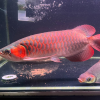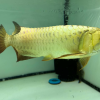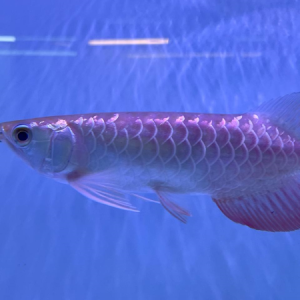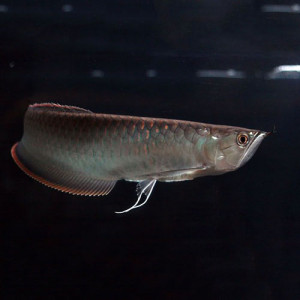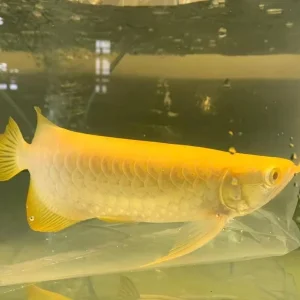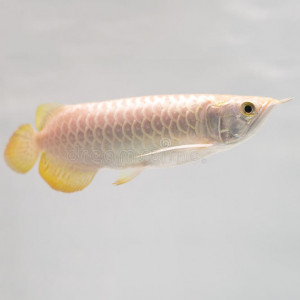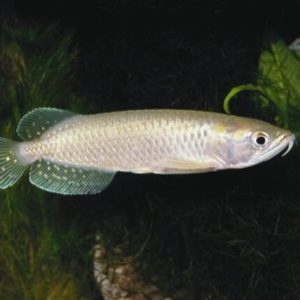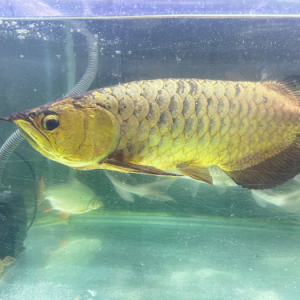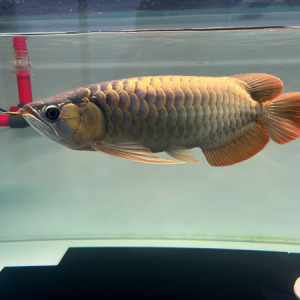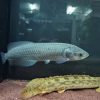African arowana for sale
$130.00 – $900.00Price range: $130.00 through $900.00
Profile: African Arowana, African Bony-tounge
Heterotis niloticus
Synonyms: Clupisudis niloticus, Sudis niloticus
Physical description: An elongated, laterally compressed species with a somewhat level back profile. The anal and dorsal fins run along the last one-third of the body. There is a cleft between these fins and the caudal fin.” The scales are large and the head is covered with bony plates. The general coloration is a light olive to silver gray, often with a silver iridescence. The head is small, while the eye is large.
Size/Length: To 36″ (90 cm)
Similar species: None
Habitat: Western and central Africa.
African arowana for sale
African arowana for sale, also known as the Nile Arowana (Heterotis niloticus), is a species of bonytongue. Despite its name, it is more closely related to arapaimas, sharing the Arapaimidae family, rather than the South American, Asian, and Australian Arowanas of the Osteoglossidae family. Unlike other Arowanas, the African Arowana has a terminal mouth and feeds extensively on plankton. We are committed to quality and environmental responsibility, breeding and exporting CITES-certified Asian Arowanas, freshwater stingrays, and Tropicana fish.

- African arowana for sale
How to feed african arowana
Feeding African arowana can be a rewarding experience, but it’s important to do it right to keep your fish healthy and thriving. These majestic creatures are carnivorous, so a diet of live and frozen foods is essential. Some popular options include small fish like guppies or goldfish, earthworms, shrimp, and insects. Be sure to vary their diet to ensure they are getting all the necessary nutrients.
Also, feeding them only one type of food can lead to nutritional deficiencies. It’s also important not to overfeed your arowana, as they have big appetites. Consequently, if over fed they can suffer from obesity if given too much food. Only feed them what they can consume in about 2-3 minutes once or twice a day for adult fish (smaller amounts for juvenile fish). Keeping their tank clean and providing good water quality is also crucial for their overall health. With the right balance of nutrition, variety in their diet, and proper feeding practices, they will be healthty.
What do african arowana eat | African arowana diet
African arowana are carnivorous fish with a diet consisting mainly of insects, small crustaceans, and small fish. In the wild, they feed on a variety of aquatic invertebrates such as worms and insect larvae as well as smaller fish that they can catch. When kept in captivity, African arowana can be fed a diet of high-quality pellets or frozen foods. Such foods like bloodworms, brine shrimp, and krill. It is essential to provide them with a varied diet to ensure they receive all the necessary nutrients for their growth and health. Additionally, occasional treats like live feeder fish or mealworms can be offered to mimic their natural feeding behaviors and provide enrichment. Overall, offering a balanced diet is crucial for the overall well-being of these magnificent freshwater predators.
How to feed African bonytongue
Feeding an African bonytongue isn’t too difficult once you understand their dietary needs. These large freshwater fish are carnivores, so they require a diet high in protein. You can feed them a variety of different foods such as live or frozen shrimp, worms, insects, and small fish. Some owners also offer commercial pellets for predatory fish. It’s important to make sure the food is the appropriate size for your bonytongue and that it is easily digestible. Additionally, be mindful not to overfeed them as this can lead to health issues. Aim to feed your African bonytongue once or twice a day, offering only what they can consume within a few minutes. By providing a balanced diet and monitoring their feeding habits, you can help ensure your bonytongue remains healthy and happy in its habitat.
How to Spot a Healthy African Arowana When Shopping for Sale
When looking to purchase a healthy African Arowana, there are a few key things to keep an eye out for. Firstly, examine the overall appearance of the fish – it should be vibrant in color and have glossy scales without any discolouration or blemishes.
Also, a healthy Arowana has to be active, alert, and responsive to movement outside the tank. Check for any signs of illness such as cloudy eyes, lesions on its body, or sluggish movements.
Additionally, ensure that the fish is feeding well and has a good appetite. Lastly, consider the environment it is being kept in. It has to be a clean tank with proper filtration and maintenance is crucial for the health of an African Arowana. By paying attention to these factors, you can confidently order a healthy Arowana for your aquarium.
Factors to Consider Before Purchasing an African Arowana
Before you buy an African Arowana, consider factors such as the size of the tank you can provide, the compatibility of the Arowana with other fish species you may have, and the level of care and maintenance essential for this particular species. Make sure you are ready to meet the needs of an Arowana before bringing one home.
- Checking for Vibrant Colors
A key sign of a healthy African Arowana is its vibrant colors. Look for a fish that displays rich, intense hues without any dullness or fading. Colors that pop indicate a well-fed and thriving Arowana.
- Examining Fins and Scales
Inspect the fins and scales of the Arowana closely. The fins should be intact, without any tears or signs of damage. The scales should be smooth, shiny, and tightly attached to the body without any peeling or missing scales. Any abnormalities in the fins or scales could be a red flag for poor health.
African bonytongue for sale
if you’re looking to add a unique and fascinating fish to your aquarium, consider checking out African bonytongue for sale.
Also known as the elephant-nose fish, these guys are native to Africa and are easily recognizable by their elongated snout resembling an elephant’s trunk. African bonytongues are quite popular among fish enthusiasts due to their interesting behavior and stunning appearance.
African bonytongues are quite popular among fish enthusiasts due to their interesting behavior and stunning appearance. They have a black or dark brown body with striking silver streaks that make them stand out in any tank. These fish are also intelligent and curious creatures, often interacting with their owners and tank mates.
African arowana price
This is a stunning freshwater fish that can be quite pricey to own. The price of an African arowana can vary depending on factors such as its size, coloration, and overall health. Generally, these fish can range anywhere from $130 to $900 in our shop. Rare color variations like Albino or Golden Arowanas can fetch even higher prices in the thousands of dollars.
It’s important to consider not only the initial cost of purchasing an African arowana but also the expenses involved in providing proper care for them such as large tanks, filtration systems, and high-quality food. Despite the price tag, many fish enthusiasts are willing to invest in these majestic creatures for their beauty and unique characteristics.
Again, African arowana price will turn to be different from suppliers and local. The price on African arowana fish varies between countries depending on the regulations and legality. Some countries will pay more and some will pay less for this fish.
African arowana usa
It’s difficult to pinpoint exactly how many people in the USA own African arowana, as these fish are not as commonly kept as their Asian counterparts. African arowanas are known for their vibrant colors and striking appearance, making them a costly possession for passionate aquarists.
While there is a niche market for these rare fish in the States, they can be quite expensive to acquire and maintain due to their specific dietary needs and tank requirements. There are likely only a small number of individuals who own African arowana in the USA, with most keeping them as part of an exotic fish collection or breeding program rather than simply as pets.
If you’re lucky enough to come across someone who owns one of these beautiful creatures, consider it a privilege to see such a unique and stunning species up close. African arowana usa sales increases as more people turn to order on a dialy.
| Select Size | 4-6inches, 6-8inches, 8-10inches, 10-12inches, 12-14inches, 14-16inches, 16-18inches, 18-20inches |
|---|
Related products
Types Of Arowana
Types Of Arowana
Types Of Arowana
Types Of Arowana
Types Of Arowana
Types Of Arowana
Types Of Arowana
Types Of Arowana



